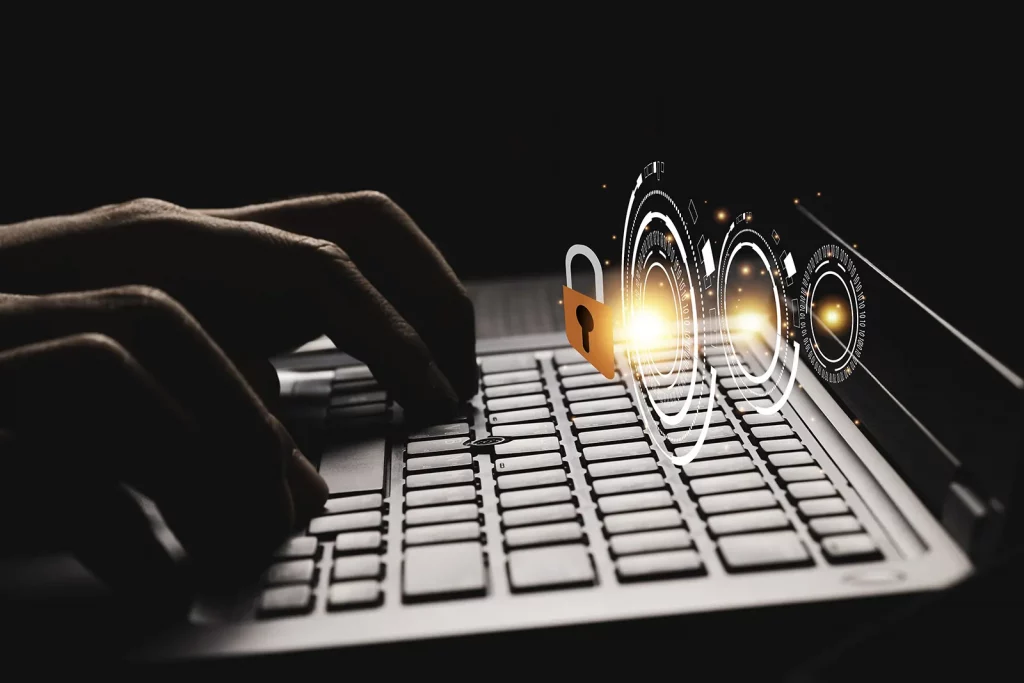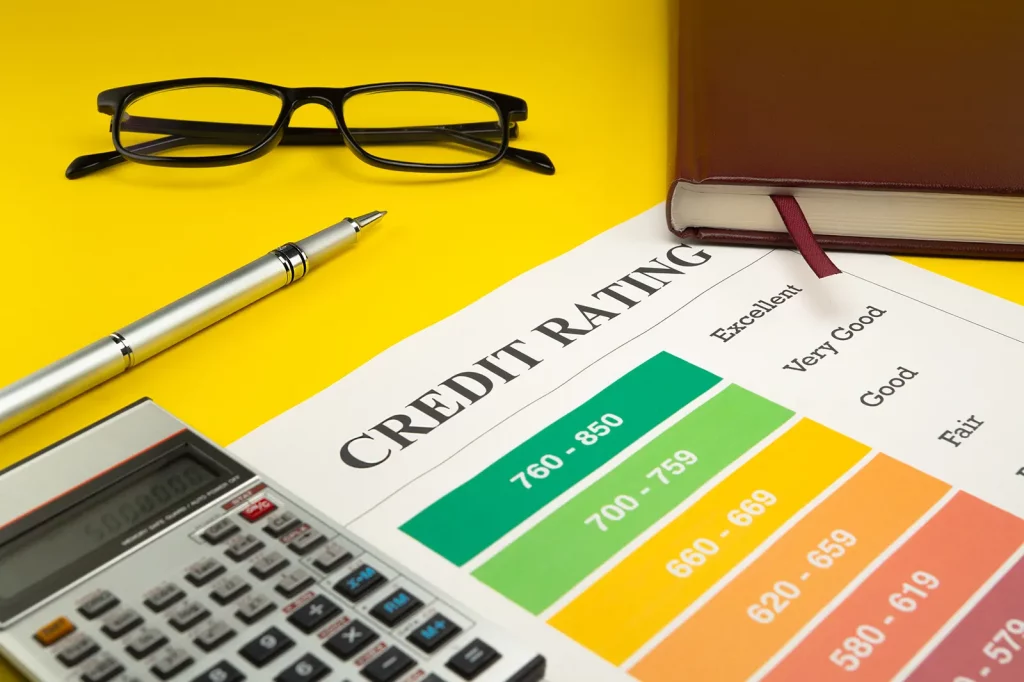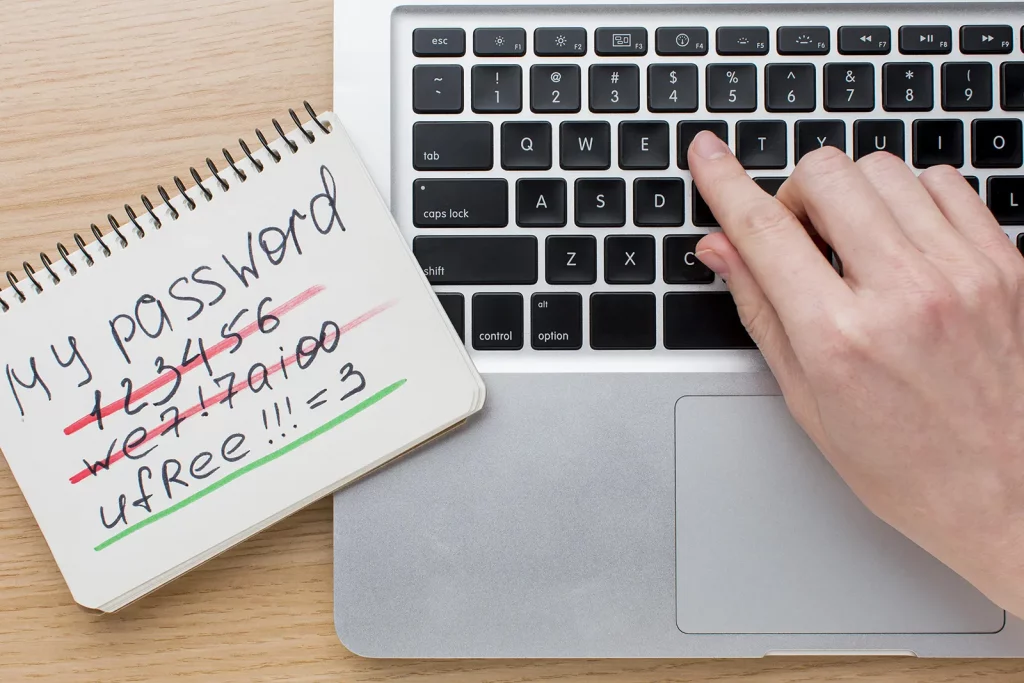Protecting your identity
When it comes to your online presence, keeping your passwords safe and secure is just as important as protecting your physical notary stamp and journal. An unethical person who has access to your workspace could easily misuse your information if they got their hands on your passwords.
Here are 5 tips for keeping your passwords safe and secure:
- Choose strong passwords that are difficult to guess. A good password should be eight characters long and include a mix of uppercase and lowercase letters, numbers, and special characters.
- Avoid using easily guessed words like your name, birth date, or favorite pet’s name.
- Don’t use the same password for all of your online accounts. If one password is compromised, all of your accounts are at risk.
- Use a password manager to help you keep track of your passwords; this can be a physical notebook or an electronic app. Check out this great article at PC Mag for the their top 11 picks.
- Change your passwords regularly, especially if you suspect that they may have been compromised. Password changes should be frequent enough that even if your password is stolen, it won’t remain valid for long. Additionally, it can help to use a password manager to store passwords in an encrypted format, and automatically generate random passwords that are difficult to guess.
Here are some more tips for protecting your identity as a Notary:
The Notary Seal is one of the most important tools of your trade. It’s also a prime target for identity thieves. Never let anyone else borrow or use your seal, and be sure to keep it in a secure location when you’re not using it. Your Notary Seal is a valuable tool, and taking the necessary steps to protect it will ensure your security and the security of those you serve. Be vigilant when it comes to protecting this important tool. Keep your Notary Seal safe at all times and remember that it is just as important as any other asset you own.

Be cautious about giving out personal information. Identity thieves can use your personal information to open new accounts, file taxes, or even get a driver’s license in your name. Be cautious about giving out your Social Security number, date of birth, or other personal information, even if you’re asked for it by someone who seems legitimate.
If you do need to provide certain personal information, ask for proof of identity and only give the necessary information. Ask for written confirmation that your information is being used for a legitimate purpose. Avoid giving out any more sensitive details than what’s necessary. It can also be useful to keep an eye on your credit report and bank accounts to make sure that no one is using your information without your permission. If you notice any suspicious activity or unauthorized charges, contact the relevant financial institution right away and take steps to protect yourself.
Protecting your Identity: Shred documents with sensitive information
Old bills, tax returns, and other documents with sensitive information can easily fall into the wrong hands if they’re not properly disposed of. Invest in a good shredder and shred any documents with personal information before you throw them away.
Most document shredders can quickly and efficiently destroy credit cards, checks, bills,, and old medical records. Having a shredder at home is an easy way to stay safe from identity theft. Additionally, shredded documents can also be recycled for an environmentally friendly disposal option. Disposing of your documents in the trash without shredding them leaves you open to potential risks. Investing in a good shredder is one of the easiest and most effective ways to protect yourself and your family from identity theft.
Protecting your Identity: Keep an eye on your credit report.
Checking your credit report regularly is an excellent way to catch any suspicious activity early. You’re entitled to a free credit report from each of the three major credit reporting agencies every year.
If you think you’ve been a victim of identity theft, act quickly. Take the next steps for protecting your identity.
Contact the credit reporting agencies and place a fraud alert on your credit reports. This will make it more difficult for someone to open new accounts in your name. You should also contact your financial institutions and close any accounts that have been tampered with or opened fraudulently.

Identity theft can be a traumatic experience, but taking some simple precautions can help you avoid it. By protecting your passwords, shredding sensitive documents, and monitoring your credit report, you can help in protecting your identity. In addition to these basic steps, there are other precautions you can take to protect your identity. Consider freezing your credit with the three major credit bureaus, so that no one can open new accounts in your name without a PIN. You should also consider signing up for services that offer identity theft protection, such as fraud alerts and monitoring of your credit reports. Finally, make sure you are aware of the latest security breaches or scams and take steps to protect yourself.
It is important to protect your Notary Journal. Do not allow unauthorized access to your journal. Keep a list of authorized people to access your journal and monitor the journal for any suspicious activity. If you think your journal has been compromised, contact your Secretary of State’s office for guidance on what to do next.
Protecting your Identity: Always Lock your Computer
And lastly, never leave your computer alone while it is unlocked.
If you need to step away from your desk, lock your computer first. This will prevent anyone from accessing your accounts or personal information. Additionally, consider activating a screensaver with a password if possible so no one can access your personal files while you’re away. Finally, always remember to sign out of any online accounts or websites you may have logged into. This will keep others from being able to access your personal information.
By following these simple tips, you can help protect your identity and keep your information safe. If you enjoyed this article and the importance of personal security as a notary, be sure to check out our article on Safe Meeting Places.

